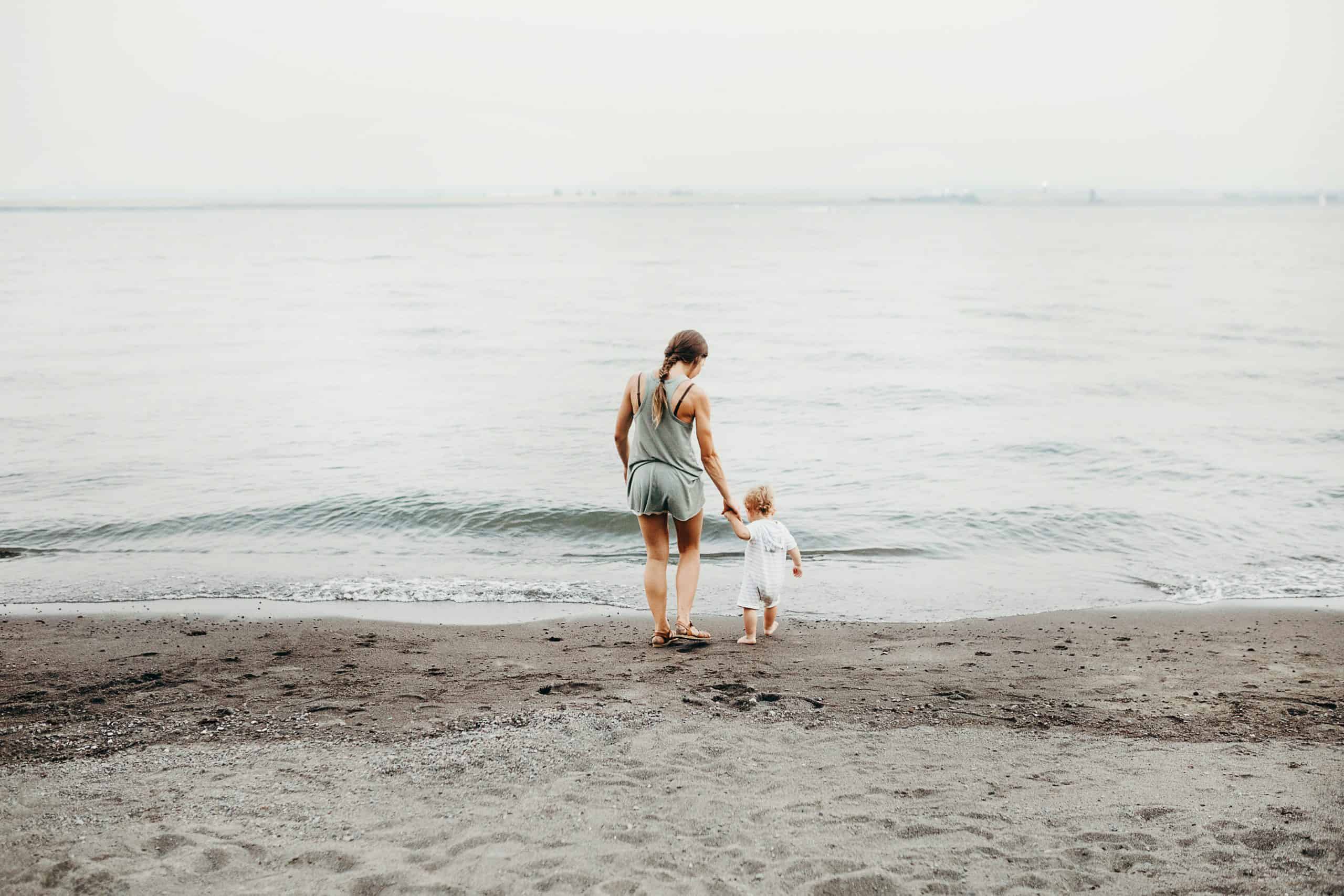I wish I was one of those people who could let things go. Some things, I can. Like how my car seems to pile up with coats, books, and ten sippy cups. Other things, I cannot. Like how I don’t craft with my kids enough, especially my super artistic daughter. Or how I turn to the television as a babysitter more days than not. Or raise my voice over a glass of spilled milk (literally, it happened this week). At night, when my precious children are tucked into bed, I sneak into their rooms and often whisper, “Mama is sorry, I’m trying, I love you so very much.” I’ll kiss them, tuck their covers, and tiptoe out, promising that tomorrow will be better. I’ll be better.
“When we feel guilt, it is a signal that we are making a choice that is not aligned with who we want to be in the world.” —Alexandra Solomon, PhD
Letting Screens Rule
Jody Fritz, a mom of two grown children, says, “I have very few regrets, but two nag me. I wished I’d significantly limited screen time and increased the amount of family responsibility through chores and yard work.”  This really resonates with me. Fewer screens, more outside time and training for real life. After all, we only have 18 years to make sure our kids are ready for adulthood. Television, iPads, and the like don’t do much in the way of preparing kids for the responsibilities to come. Shadowing us through daily life and then adopting some of our responsibilities as their own do.
This really resonates with me. Fewer screens, more outside time and training for real life. After all, we only have 18 years to make sure our kids are ready for adulthood. Television, iPads, and the like don’t do much in the way of preparing kids for the responsibilities to come. Shadowing us through daily life and then adopting some of our responsibilities as their own do.  Resolving this regret begins with, you guessed it, y-o-u. Fisher says, “… if you regret not setting better boundaries for [your kids] with technology … be sure to model healthy boundaries now with technology because actions speak louder than words.” Phones down, mom and dad—it starts with us.
Resolving this regret begins with, you guessed it, y-o-u. Fisher says, “… if you regret not setting better boundaries for [your kids] with technology … be sure to model healthy boundaries now with technology because actions speak louder than words.” Phones down, mom and dad—it starts with us.
Going Too Fast
It’s common these days to hear about being present—the whole “stop and smell the roses” mentality. It’s easy to say, much harder to practice. Life is fast. Our to-do lists are long. Day in and day out, our kids need us hundreds of times, and parents are run ragged trying to keep up. It’s hard to slow down and just enjoy the little things.  Lori Heller, a mom of three, says her biggest parenting regret is not “slowing down more [and] enjoying the everyday moment.” She continues: “I’m realizing how fast it goes by. My kids are growing so fast, I feel like I missed so much by trying to be the perfect mom.” And even the “perfect moms” (the ones we see while scrolling through social media) make mistakes. Promise.
Lori Heller, a mom of three, says her biggest parenting regret is not “slowing down more [and] enjoying the everyday moment.” She continues: “I’m realizing how fast it goes by. My kids are growing so fast, I feel like I missed so much by trying to be the perfect mom.” And even the “perfect moms” (the ones we see while scrolling through social media) make mistakes. Promise.  Heller isn’t the only one with this regret. Melissa Swofford, a mom of five, shares, “Life is so busy and chaotic so much of the time—I have to stop and remind myself that I won’t get these moments back. So what if our sink is overflowing with dishes? Stop for that one second to take in what ever ‘the moment’ may entail.”
Heller isn’t the only one with this regret. Melissa Swofford, a mom of five, shares, “Life is so busy and chaotic so much of the time—I have to stop and remind myself that I won’t get these moments back. So what if our sink is overflowing with dishes? Stop for that one second to take in what ever ‘the moment’ may entail.”
Being a Worrywart
So many parents shared that they regret allowing worry to consume them. From babies’ milestones to coughing fits to school choices to grades, worry is a natural part of parenting. But the goal is to push that worry to the backseat.  “Choose to be led by love instead,” Tesse Struve, founder of Millennial Mom Coaching says. “When you lead with love and choose your actions from a place of love instead of fear, you will start to feel better about your choices and actions around your family.”
“Choose to be led by love instead,” Tesse Struve, founder of Millennial Mom Coaching says. “When you lead with love and choose your actions from a place of love instead of fear, you will start to feel better about your choices and actions around your family.”
Prioritizing the Wrong Things
Most parents would say that their family is their number one priority, the driving force behind all they do. But do our actions really line up with our words? Not always. Daniel Reeser, a dad of two, provides a great example of what aligning our priorities really looks like. He says that he regrets “not taking enough time off work (even though I had extra time to take) after my first child was born to support mom at home more.” The good news is that baby number two followed, and Reeser made a change: “[With my] second, I took more time off work than mom did, and it was great!”  Gayla Duerr, a mom of four grown children, says that when she reflects back on raising her children, she “would opt for much less time sitting in bleachers and more time serving together as a family.” Sports are such a part of our culture that it’s hard to say no, especially when our kids participate alongside their friends. But I think Duerr relays an important idea. Are we trying to raise athletes or people who are ready and willing to give back to their community? Where we devote our time speaks volumes.
Gayla Duerr, a mom of four grown children, says that when she reflects back on raising her children, she “would opt for much less time sitting in bleachers and more time serving together as a family.” Sports are such a part of our culture that it’s hard to say no, especially when our kids participate alongside their friends. But I think Duerr relays an important idea. Are we trying to raise athletes or people who are ready and willing to give back to their community? Where we devote our time speaks volumes.
Not Taking Care of Myself
Heidi Duncan, a mom of one, points to the earliest days of her parenting when thinking about her regrets. “[I regret] that I didn’t address my postpartum depression earlier. It sucked the life and joy out of early motherhood.”  Duncan isn’t alone: More than 600,000 women suffer from postpartum depression every year. Self-care doesn’t stop at postpartum though. Parents can’t pour from an empty cup, and as I always say, a well taken care of mom is able to take care of her family well.
Duncan isn’t alone: More than 600,000 women suffer from postpartum depression every year. Self-care doesn’t stop at postpartum though. Parents can’t pour from an empty cup, and as I always say, a well taken care of mom is able to take care of her family well.
Giving Social Media Power
We live in a digital age, and social media isn’t something that can be 100 percent avoided. Many parents regret how social media affects them, and Jamie Durham, a mom of four, says that she most regrets “allowing social media to dictate how I raise my kids … I felt condemned that no matter what I chose to do, I was doing it wrong according to someone.” Durham says that since identifying this, she has worked to set boundaries and focus more on knowing her own family, “[which] turns out to be the best way of knowing what they need. No article or blog post can teach me that!”
Mom Twitter is canceled. Y’all are too much.
— michelle (@lynnmishy11) January 27, 2018
Mark Sharp, PhD, a licensed clinical psychologist, sees all too often how the influx of information affects parents. He says, “I would encourage parents to make sure they are forming their own values and acting from them rather than listening too much to the myriad of messages out there telling them how to be a good parent. Our culture is quick to judge parents, but the most important things are simple: love your kids, value them, let them know those things, and then do the best you can.”  Struve affirms the steps Durham took to overcome her regret: “The first step to handling any guilt or regret over a parenting choice is to identify what you are feeling and why.” That’s exactly what Durham did. And now she balances a little social media with a lot of family knowledge.
Struve affirms the steps Durham took to overcome her regret: “The first step to handling any guilt or regret over a parenting choice is to identify what you are feeling and why.” That’s exactly what Durham did. And now she balances a little social media with a lot of family knowledge.
Say goodbye to regret.
Solomon says the first step in moving past regret and the shame associated with it is to say it out loud: “Shame grows in silence, so one step toward shifting out of a place of shame is giving it voice—to your partner, to your therapist, to your trusted friend. Receiving some empathy from someone you trust can break the shame and help you move into a place of committing to making different choices.” “There’s no such thing as a perfect parent, so each parent’s journey is to figure out how to be good enough.” —Alexandra Solomon, PhD  If you’re holding on to some deep-seated regret within your parent/child relationship, make plans to get it off your chest. That momentum will empower you to revisit your values, apologize if needed, and move into a better place. Struve recommends putting a positive spin on regret, “… sit down and write down all of the wonderful things you have done right as a parent. When you start focusing on the positive, then you can release the regret and the guilt, and move your family into a space of joy and fulfillment.”
If you’re holding on to some deep-seated regret within your parent/child relationship, make plans to get it off your chest. That momentum will empower you to revisit your values, apologize if needed, and move into a better place. Struve recommends putting a positive spin on regret, “… sit down and write down all of the wonderful things you have done right as a parent. When you start focusing on the positive, then you can release the regret and the guilt, and move your family into a space of joy and fulfillment.”



